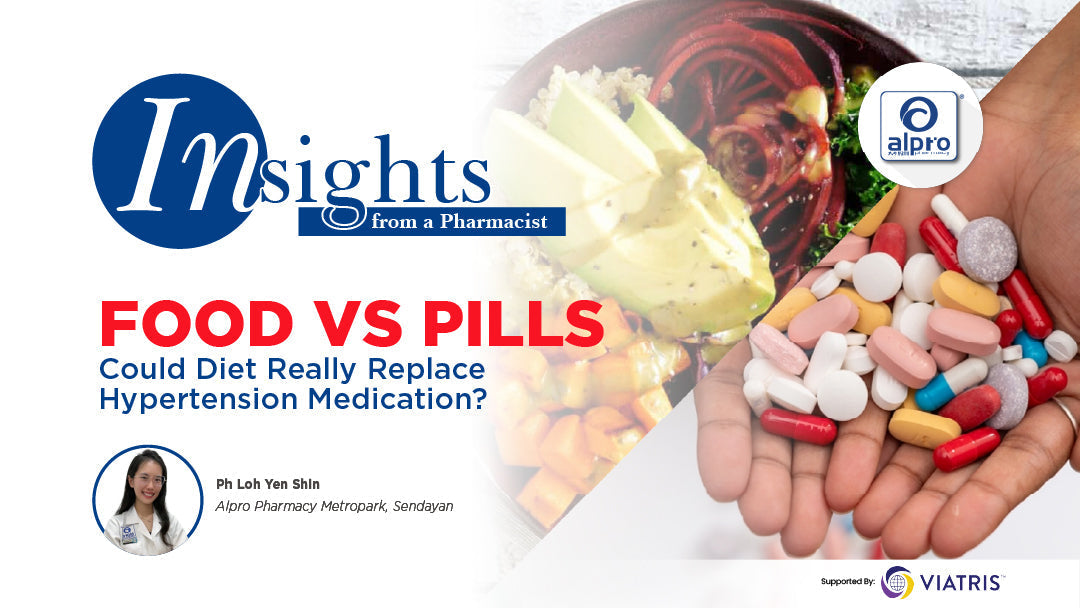
Food vs. Pills — Could Diet Really Replace Hypertension Medication?
“I have eaten a healthy diet… so could I stop my medications? ”
If you’ve ever thought of this — you’re not alone.
Many Malaysians try to control their blood pressure naturally by cutting salt, eating more vegetables, or drinking herbal remedies. While those efforts are good (and necessary!), the big question remains:
Can healthy eating actually replace medication for hypertension?
Let’s break it down.

🍽️ What Role Does Diet Play in Blood Pressure?
Food has a powerful effect on your blood pressure. In fact, the DASH Diet (Dietary Approaches to Stop Hypertension) is proven to help lower Blood Pressure by:
✅ Reducing sodium (salt) intake
✅ Increasing potassium-rich foods (like bananas, sweet potatoes)
✅ Promoting fruits, vegetables, whole grains, lean proteins
In other words, YES — food helps. A good diet can improve heart health and even reduce the need for higher medication doses over time [1].
BUT, food alone is often not enough to replace your prescribed Blood Pressure medications.
💊 Why You Still Need Medication (for now and ongoing)

Here’s what many do not realise:
Even if you “feel fine” and eat clean, high blood pressure can still silently damage your heart, brain, kidneys, and eyes [2].
Blood pressure medication works silently in the background, keeping your Blood Pressure within a safe range everyday, 24/7. Your blood pressure could rise again without warning if you skip your blood pressure pills regularly even when you have been practising a healthy and clean diet. [3].
Once complications like stroke or kidney failure happen, they may be permanent or even fatal.
📊 What Studies Say

📌 A major review from WHO shows that up to 75% of patients with hypertension stop taking their meds within a year — often because they “feel better” or think that their diet is good enough [4].
But studies also show that:
- Stopping meds increases risk of stroke by up to 4 times
- Even short gaps in medication raise your Blood Pressure again [3]
Conclusion: Diet is important, as it supports medication — not replaces it.
🍎 The Best Plan? Diet + Pills + Consistency
Think of managing high BP like a triangle:
- 🥗 Healthy Eating – controls salt, supports heart health, reduce burden on the heart
- 🏃 Lifestyle Changes – exercise, sleep, stress management
- 💊 Medication Adherence – the foundation that keeps Blood Pressure stable daily
👉 All three of these work together. Remove any one could cause the triangle to collapse.
When Can You Reduce or Stop The Medication?

In some cases, doctors may reduce your dose or stop your medication if your lifestyle changes are effective over time.
But this must be done under professional supervision, with proper Blood Presuure tracking and lab tests. Never stop your medication just because:
- Your Blood Pressure was normal last month
- You’ve started eating oats or garlic
-
You feel “okay” and have no symptoms
A Friendly Reminder from A Pharmacist
“It’s not just about taking medicine — it’s about taking control of your health.”
We believe in empowering you to make informed decisions. That includes supporting your:
✔️ Diet and lifestyle changes
✔️ Medication routine
✔️ Monitoring and follow-up care
Never stop taking your medication solely out of concern for potential long-term side effects — always seek guidance from a healthcare professional before making any changes.
Need Help in Consistency and Medication Adherence ?
Visit your nearest Alpro Pharmacy to speak to our friendly pharmacists. We’re here to help you:
✔️ Monitor your Blood Pressure regularly
✔️ Understand your medication
✔️ Refill before running out
Eat well. Move more. But don’t ditch the meds.
Hypertension is a long-term condition — and long-term consistency is key to avoiding life-changing complications.
Because when it comes to your heart, “sometimes” is never enough.
📚 References:
[1] National Heart, Lung, and Blood Institute. (2020). DASH Eating Plan.
[2] Ministry of Health Malaysia. (2020). Clinical Practice Guidelines: Hypertension (5th Edition).
[3] CDC. (2023). High Blood Pressure Facts. Retrieved from https://www.cdc.gov/bloodpressure
[4] WHO. (2021). Adherence to Long-Term Therapies: Evidence for Action.

